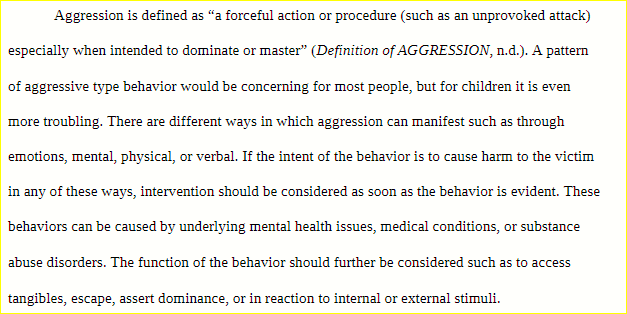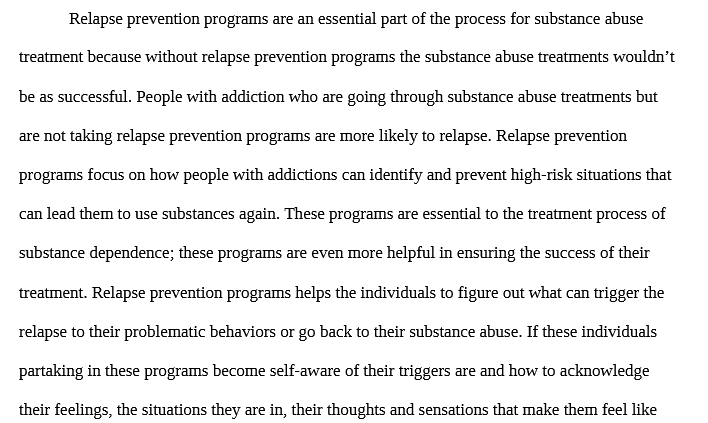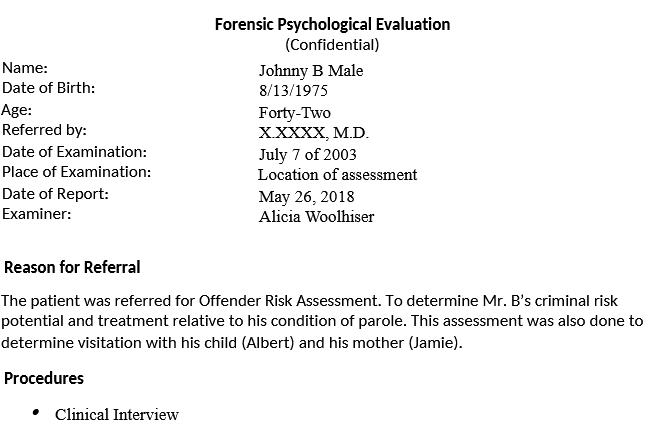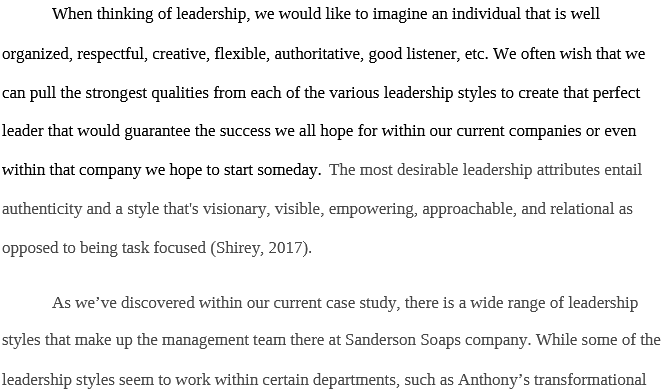PSY 638 Short Paper Module 8 Aggression in Childhood.docx- Snhu
$3.99
PSY 638 Short Paper Module 8 Aggression in Childhood.docx- Snhu
Aggression is defined as “a forceful action or procedure (such as an unprovoked attack)especially when intended to dominate or master” (Definition of AGGRESSION, n.d.). A pattern of aggressive type behavior would be concerning for most people, but for children, it is even more troubling. There are different ways in which aggression can manifest such as through emotions, mental, physical, or verbal. If the intent of the behavior is to cause harm to the victim in any of these ways, intervention should be considered as soon as the behavior is evident. These behaviors can be caused by underlying mental health issues, medical conditions, or substance abuse disorders. The function of the behavior should further be considered such as to access tangible, escape, assert dominance, or in reaction to internal or external stimuli. Assessment of the role of AggressionAggression has categorized two different ways within the psychological community: impulsive aggression and instrumental aggression.
Description
PSY 638 Short Paper Module 8 Aggression in Childhood.docx- Snhu
Aggression is defined as “a forceful action or procedure (such as an unprovoked attack)especially when intended to dominate or master” (Definition of AGGRESSION, n.d.). A pattern of aggressive type behavior would be concerning for most people, but for children, it is even more troubling. There are different ways in which aggression can manifest such as through emotions, mental, physical, or verbal. If the intent of the behavior is to cause harm to the victim in any of these ways, intervention should be considered as soon as the behavior is evident. These behaviors can be caused by underlying mental health issues, medical conditions, or substance abuse disorders. The function of the behavior should further be considered such as to access tangible, escape, assert dominance, or in reaction to internal or external stimuli. Assessment of the role of AggressionAggression has categorized two different ways within the psychological community: impulsive aggression and instrumental aggression.
PSY 638 Short Paper Module 8 Aggression in Childhood.docx- Snhu
The first time, impulsive aggression, spawns from strong emotions and is not planned behavior (Blair, 2016). Impulsive aggression would occur during a heated moment such as when a child loses a game and throws the game board, controller, or another game-related item. This form of aggression is related to the threat response in the brain as described by Blair (2016) and is addressed through mood management. The other form of aggression, instrumental, is planned aggressive behavior that is designed to achieve some goal (Gartrell, 2011). An example of instrumental aggression is an armed robbery “an aggravated form of theft that involves the use of a lethal weapon to perpetrate violence or the threat of violence (intimidation) against the victim” (Armed Robbery | Crime, n.d.).Young children and infants typically will use physical behavior to express their anger or frustration such as hitting or biting. This area of development marks significant changes in concepts such as self-awareness, interpersonal communication, as well as independence.
PSY 638 Short Paper Module 8 Aggression in Childhood.docx- Snhu
- PSY 211 – Lifespan Development (5015 Documents),
- PSY 215 – Abnormal Psychology (4335 Documents),
- PSY 108 – Introduction to Psychology (3759 Documents),
- PSY 223 – Statistics for Psychology Research (2652 Documents),
- PSY 216 – Psychology of Personality (1841 Documents),
- PSY 510 – Research Methods (1748 Documents),
- PSY 520 – Research Methods in Psychology II (1469 Documents),
- PSY 257 – Psychology (1451 Documents),
- PSY 310 – Criminal Psychology (1393 Documents),
- PSY 200 – FOUNDATIONS OF ADDICTIONS (1379 Documents),
Only logged in customers who have purchased this product may leave a review.







Reviews
There are no reviews yet.